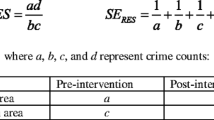Abstract
Tobacco settlement money can be allocated to nonprofit organizations or government agencies. Both have advantages and disadvantages. Nonprofit organizations may have relatively (a) more efficiency/flexibility, but less accountability; (b) narrower focus, but less experience; (c) more ability to advocate, but more obligations; (d) more independence from tobacco industry influence, but less funding; and, (e) more public trust, but less visibility. The present case study of the Partnership for a Healthy Mississippi focuses on six interconnected areas: education (school and community), raising awareness, advocacy, service, enforcement, and research. In 1999 and 2000, tobacco use declined in Mississippi, even compared to neighboring states. This unique partnership's multifaceted approach to social change probably facilitated this decline.
Similar content being viewed by others
Rights and permissions
About this article
Cite this article
Carver, V., Reinert, B., Range, L. et al. Nonprofit Organizations versus Government Agencies to Reduce Tobacco Use. J Public Health Pol 24, 181–194 (2003). https://doi.org/10.2307/3343512
Published:
Issue Date:
DOI: https://doi.org/10.2307/3343512




